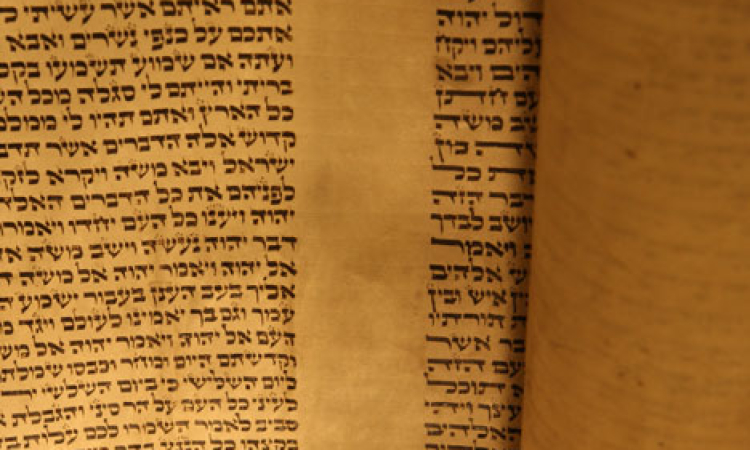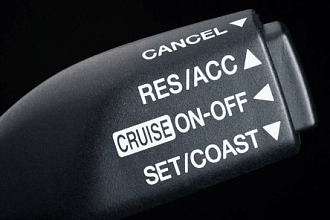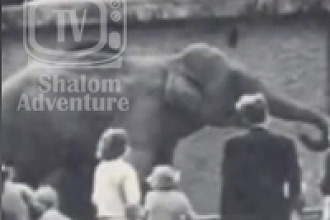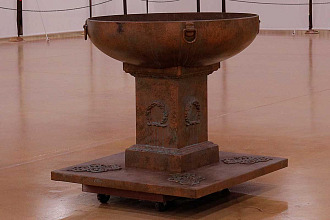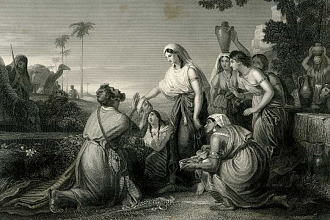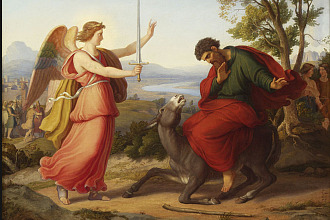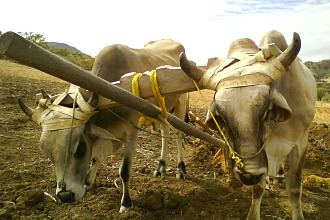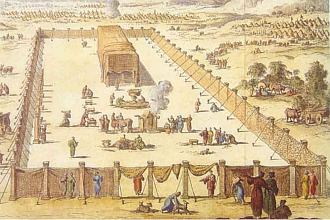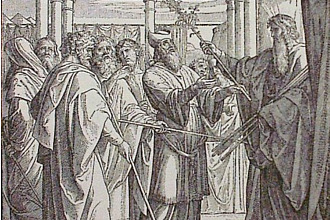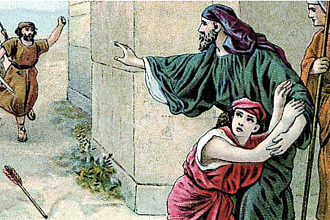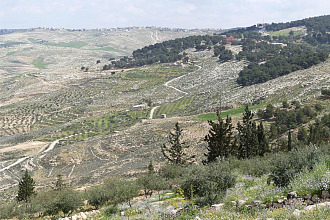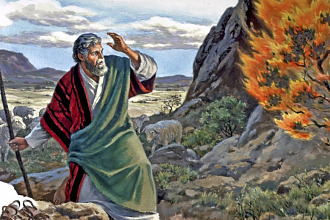Parasha for the Week: Vayikra: Leviticus 1:1 – 5:26
Aftarah for the Week: Isaiah 43:21 – 44:23
Besorat Yeshua: Romans 12: 1 - 3
Overview
The Book of Vayikra (Leviticus), also known as Torat Kohanim — the Laws of the Priests — deals largely with the korbanot (offerings) brought in the Mishkan (Tent of Meeting).
The first group of offerings is called korban olah, a burnt offering.
The animal is brought to the Mishkan's entrance. The one bringing the offering sets his hands on the animal. Afterwards it is slaughtered and the kohen sprinkles its blood on the altar. The animal is skinned and cut into pieces. The pieces are arranged, washed and burned on the altar.
Various meal offerings are described. Part of the meal offering is burned on the altar, and the remaining part eaten by the kohanim. Mixing leaven or honey into the offerings is prohibited.
The peace offering, part of which is burnt on the altar and part is eaten, can be either from cattle, sheep or goatsThe Torah prohibits eating blood or fat.
The offerings that atone for inadvertent sins committed by the Kohen Gadol, by the entire community, by the prince and by the average citizen are detailed.
Laws of the guilt-offering, which atones for certain verbal transgressions and for transgressing laws of ritual purity, are listed.
The meal offering for those who cannot afford the normal guilt offering, the offering to atone for misusing sanctified property, laws of the "questionable guilt" offering, and offerings for dishonesty are detailed.
"THE FIRST MONTH OF THE YEAR"
This coming Sabbath is a special Sabbath, that is why it is called “Shabbat Hachodesh” (Shabbat of the Month). It is the first day of the month, and not any month, but the month of Nissan, the first month of the Biblical Calendar. That means he we really want to follow the Biblical Calendar, Shabbat March 17, should be the first day of the new year. But nobody follow anymore the Biblical calendar, not the Jews, who have adopted the month of the September as the first of the year, let’s remember that Rosh Hashana is sometime in September. And Christians have adopted the pagan calendar very long time ago.
In fact, in the five Books of the Torah, the months as the days of the week of the creation are called by numbers. The calendar begins with Nissan which is called the “first month”. Then all the biblical dates and feasts are related to Nissan. When it is written that the Yom Kippur has to be celebrated on the 10th day of the 7th month. The 7th month is connected to Nissan, which is the first of the year.
"NISSAN: MONTH OF THE DELIVERANCE"
Nissan is the 1st month of the year, because it is the month of Passover, the month of the Exodus. The Exodus is like the rebirth (born again) of the people of Israel. That’s why the Israelites had to remember the Exodus every day of their life.
The word Nissan comes from the Hebrew word Ness which means “miracle.” Indeed, this is a special month in which the greatest of all miracles took place for G-d’s people. The Exodus and the open of the Red Sea.
The Talmud tells us that if someone sees the word Nissan in a dream, then miracles will happen to him.
Passover is the month of the deliverance, it is month of the Exodus but also the month of Mashiach revelation. The Jewish people expect the coming of Mashiach on Nissan. It is the most favorable month for the deliverance. That is why during the Seder, if the Jews drink 4 cups of grape juice or wine, all related to G-d’s salvation. A fifth cup is poured out, which is reserved to the prophet Elijah, who has to precede the Messiah or to the Messiah himself, who is the only one who has the right or is able to drink it. This cup is called the cup of the wrath of G-d, Indeed, the Mashiach gave his life on the very first night of Pessach. But he was hidden (this is is illustrated during the Seder by the Afikomen, which is hidden until the end of the meal. The Messiah was recognized only by those who were ready to recognize him. He is fulfilling the afikoman. Let’s remember that the Afikoman is broken, like Mashiah’s life was broken. The Afikoman is hidden, like Mashiach who hid his glorious origin and mission in a humble human appearance. At the Seder, young children have to be involved in the teaching, that is why all the children of the house are going with excitement to search for the Afikoman. Only those who are willing to search are enabled to find it and to receive the price for their effort. Yeshua said: “I tell you the truth, unless you change and become like little children, you will never enter the kingdom of heaven. (Matthew 18:3).
"PRAYERS WITH TEARS"
Leviticus opens with the numerous and complex laws concerning the Temple sacrifices. With the destruction of the Temple, prayer - avodah (service) of the heart - replaced the avodah of the sacrifices. Yet in the Talmud (Berachot 32b) we are informed that from the time the Temple was destroyed, the gates of prayer were also locked. But the gates of tears were not locked. Rashi explains that the gates of tears refers to another type of prayer - prayer with tears.
"G-D NEEDS OUR PRAYERS"
Our tefilot and berachot (prayers of blessings) are a means to open up the conduits of G-d’s good to the world by entering into a relationship with Him. When one pronounces a prayer or makes a blessing before he eats, he activates those spiritual realms through which G-d provides food and opens wider the conduits of G-d’s bounty. On the other hands, the Talmud says “one who does not make a blessing is like a thief, for he does not compensate for what he removes from the world”. (Berachot 35a).
.
"A SUBSTITUTIONAL SACRIFICE"
One of the main topics of this week’s Torah portion is the idea of korban, “sacrificial offering.” This concept may come as somewhat of a surprise, for if Judaism believes in an all-powerful, transcendental G-d, what is the purpose of the korban? After all, why would G-d, who creates and sustains all, need our offerings? The word korban is derived from the root KaRoV, “to come close.” The korban is the act which allows man to come close to G-d.
Teshuva is not only a return to G-d, it is also a return to oneself, to the potential within man, to the image of G-d within each and every one of us. When man repents, he returns to the core of G-dliness within himself, that tzelem Elohim, the “image of G-d” that is his essence: “Seek the L-rd while he may be found; call on him while he is near.” (Isaiah 55:6).
Haftara: Isaiah 43:21 – 44:23
This beginning of the book of Leviticus is about the sacrifices that Israel had to offer to G-d for the forgiveness of her sins.
In the Haftara, Israel was not always faithful in her service to the Lord: “You have not brought me your sheep for burnt offerings, or honored me with your sacrifices.” (Isaiah 43:23), however, the Lord is a G-d of love not a Lord of blood, that is why he is always ready to forgive: “I, I am he who blots out your transgressions for my own sake, and I will not remember your sins.” (Isaiah 43:25). One of the fundamental value of the Bible is that when G-d choose a people he choose him forever: “Thus says the LORD who made you, who formed you from the womb and will help you: Fear not, O Jacob my servant, Jeshurun whom I have chosen.” (Isaiah 44:2). The Lord wants to bless His people with His spirit: “For I will pour water on the thirsty land, and streams on the dry ground; I will pour my Spirit upon your offspring, and my blessing on your descendants.” (Isaiah 44:3).
Israel is witness to G-d, He is the one who can prove that G-d is G-d and has given true prophecies about his people and about history “Who is like me? Let him proclaim it. Let him declare and set it before me, since I appointed an ancient people. Let them de-clare what is to come, and what will happen. Fear not, nor be afraid; have I not told you from of old and declared it? And you are my witnesses! Is there a God besides me? There is no Rock; I know not any.” (Isaiah 44:7–8). God is always calling back His people to him: “I have blotted out your transgressions like a cloud and your sins like mist; return to me, for I have redeemed you.” (Isaiah 44:22). The return of Israel to her God will produce joy in Heaven: “You have not brought me your sheep for burnt offerings, or honored me with your sacrifices. I have not burdened you with offerings, or wearied you with frankincense.” (Isaiah 43:23). Are we ready to rejoice with Israel for her return to God ?
Apostolic Writings: Hebrew 5:1-4
The book of Leviticus, Vayikra, which is also called Torat haCohanim (Law of the Priests) gives to the Levites and Cohanim all instructions concerning the service in the Sanctuary, their duty, functions and particularly about the sacrifices. This book starts saying to Moses: “The LORD called Moses and spoke to him from the tent of meeting, saying, “Speak to the people of Israel and say to them, When any one of you brings an offering to the LORD, you shall bring your offering of livestock from the herd or from the flock. If his offering is a burnt offering from the herd, he shall offer a male without blemish. He shall bring it to the entrance of the tent of meeting, that he may be accepted before the LORD. He shall lay his hand on the head of the burnt offering, and it shall be accepted for him to make atonement for him.” (Leviticus 1:1–4). Atonement will be done, according to Leviticus, through the sacrifice of livestock from the herd or from the flock. That means it should be a very precious animal for the Israelite. An animal which has been in the family from his birth until the moment of the sacrifice. We all know how family members are at-tached to their animals, they lived with the family, they were feed by the children, and suddenly this animal has to be brought in the sanctuary and sacrificed, why? Because we have sinned, I can imagine that the family and especially the children were sad to accept that their father has to do this sacrifice.
The people of Israel were not very rich, especially at the beginning of their life in the Promise land, that is why each family had not too many animals. Thus, it is easy to understand that this situation which could be common in Israel was a real sacrifice, they had not a lot of money, not too many animals and suddenly they have to sacrifice one of their own animal, without eating it or selling it, it was a big loss of money. Through this pain and lost, G-d wanted to demonstrate to Israel the gravity of committing a sin.
Since of book of Leviticus is the Torat HaCohanim, it describes not only the sacrifices offered on the altar of the Sanctuary, but also gives us a clear de-scription of the ministry of the priests, their function, their dedication and ordination.
The specificity of the Leviticus priesthood is that Aaron and his sons were chosen from the tribe of Levi. The letter written to the Hebrews (Jews) gives us very good insights about the symbolism of the priesthood according to Aaron, it says: “For every high priest chosen from among men is appointed to act on behalf of men in relation to G-d, to offer gifts and sacrifices for sins. He can deal gently with the ignorant and wayward, since he himself is beset with weakness. Because of this he is obligated to offer sacrifice for his own sins just as he does for those of the people. And no one takes this honor for himself, but only when called by G-d, just as Aaron was.” (Hebrews 5:1–4). The priesthood of Aaron, is not a perfect priesthood. 1) Aaron is “chosen from among men” 2) he has he own “weakness” 3) because of this weakness he is “obligated to offer sacrifice for his own sins.” That is why the author of this letter, who knew very well the priesthood system and its implication in relation with G-d, explains the superiority of Yeshua’s priesthood. Yeshua was not chosen among the Levites or among men, since he was the incarnation of G-d on earth. Yeshua lived a perfect life on earth, and even he was tempted in everything he did not commit any sin, and of course because Yeshua is perfect, has never committed any sin he does not need to offer a sacrifice for himself. He is the perfect intermediary between G-d and us. Salvation, which comes from Yeshua is much better than salvation coming from Aaron and his priesthood.
The next information we have is that G-d has designated Yeshua to be Cohen Gadol (High Priest) according to the priesthood of Melchizedek. This priesthood is an eternal priesthood. We read in the Psalms: “You are a priest forever after the order of Melchizedek.” (Psalms 110:4) Melchizedek, was a priest in the time of Abraham, who was never born (we don’t have any indication of his genealogy and his birth) and who never died (we don’t have any indication about his death) The book of Genesis, which is a book of genealogy, should give us these information, but he did not. That is why in the tradition of the Hebrew Bible, his priesthood is forever. Yeshua, the Messiah, is the one who has been made priest according to Melchizedek.
The priesthood of Yeshua started two thousand years ago and is a permanent priesthood and this priesthood is perfect. Yeshua is interceding for us, we can approach his throne with confidence. Praise the L-rd.

